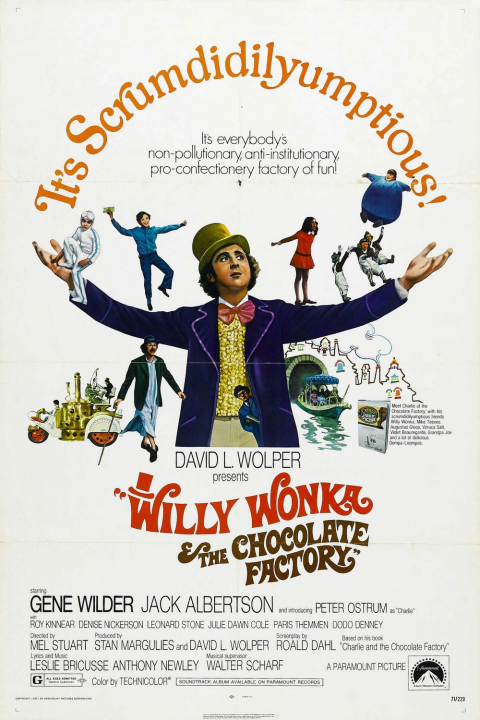I’m baaaaaaaaaaack!
What can I say? Between the pandemic and the 2020 drive-in season ending, I just haven’t felt much like writing the past six months, but now that the Mahoning’s got the Simplex projectors shining again, I’m going to try to find some rhythm.
Directed by Mel Stuart
Written by Roald Dahl, based on his novel, Charlie and the Chocolate Factory, and David Seltzer (uncredited)
Cast: Gene Wilder, Jack Albertson, Peter Ostrum, Roy Kinnear, Julie Dawn Cole, Leonard Stone, Denise Nickerson, Nora Denney, Paris Themmen, Ursula Reit, Michael Bollner, Diana Sowle, Aubrey Woods, David Battley, Günter Meisner, Peter Capell
Soundtrack: Walter Scharf (score), Anthony Newley & Leslie Bricusse (songs)
After nearly five decades of traumatizing children (myself included), I’m not sure there’s anything new that I can say about Willy Wonka & the Chocolate Factory (even RedLetterMedia‘s done a review by now), but what is life if not exercising futility?
As the story goes, director Mel Stuart’s daughter read Roald Dahl’s book and wanted her dad to turn it into a movie. It wasn’t Stuart’s first feature film, he did have a couple under his belt already, but the vast majority of his experience to that point was in documentaries (honestly, I know it’s a sounds like a strange comparison, but the circumstances remind me a bit of William Friedkin directing The Exorcist, although he also had an important movie in 1971, and he also happened to work for Stuart and producer David L. Wolper on ABC’s 1966 documentary The Thin Blue Line).
Second only to the casting of Gene Wilder (who we’ll get to), Stuart’s direction is the lynchpin of the operation. For one, there was a severely limited budget for the kind of film being made, and he undoubtedly knew how do things in an economical way; but, artistically, his documentary background comes in handy in giving the movie any sort of legitimate grounding (which is severely lacking in the Tim Burton remake), particularly in the first act, in order the make the later fantastical elements more real (along with some wonderfully matter-of-fact dry humor).
But, of course, it’s Willy Wonka’s world, and perhaps no actor, not even “Sean Connery IS James Bond” (speaking of Roald Dahl…), has defined a character more than Gene Wilder in the titular role (sorry, Johnny Depp… Actually, no, I’m not sorry). It’s not my personal favorite film of his (that would be Silver Streak), but I’m hard pressed to say that it’s not Wilder’s best performance. He’s not even introduced until nearly halfway through the movie, yet he is instantly indelible; with charm, with wit, and with more than a bit of sarcasm, but, in the end, heart.
However, the biggest heart of them all is young Charlie Bucket, admirably played by Peter Ostrum in his first and only acting role (he went on to become a veterinarian). Not to say that the other kids and parents don’t do a fine job, but they really nailed it with his casting; it’s hard to imagine the film without him either.
In the end, not only does the movie still hold up some five decades later on its own merits, its cultural impact is undeniable. From The Office to Futurama and beyond, Willy Wonka is one of the most referenced films of all time (not to mention the ever-enduring meme); though I’m not sure how many folks would have guessed that in 1971, as it struggled to break even at the box office in its initial theatrical release. But, as happens with certain properties, it found new life on network television screenings, and, later on, home video rentals.
Not bad for a little movie that could.
Rating: ★★★★☆

